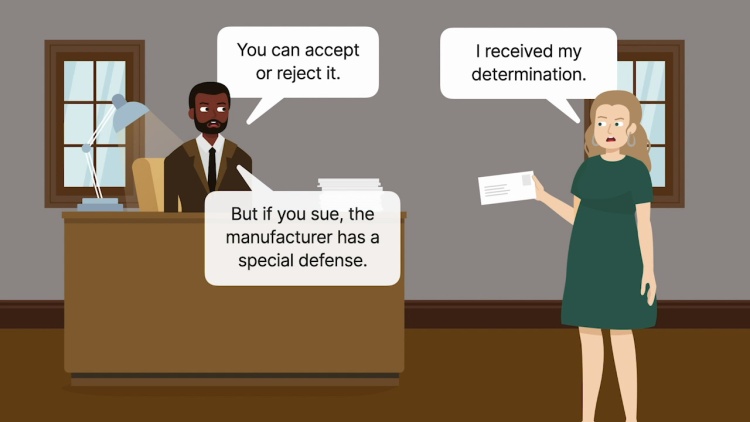Bruesewitz v. Wyeth LLC
United States Supreme Court
562 U.S. 223, 131 S.Ct. 1068, 179 L.Ed.2d 1 (2011)
- Written by Angela Patrick, JD
Facts
Hannah Bruesewitz (plaintiff) received a diphtheria, tetanus, and pertussis vaccine made by Wyeth LLC (defendant) when she was about six months old. Bruesewitz started having seizures within 24 hours of receiving the vaccine. Bruesewitz was eventually diagnosed with a residual-seizure disorder and developmental delays that followed her as she grew up. Bruesewitz’s parents filed a claim under the program enacted by the National Childhood Vaccine Injury Act of 1986 (NCVIA). This federal program was created to control manufacturer liability after lawsuit costs drove several manufacturers to stop making certain vaccines. The NCVIA program required children injured by vaccines to first file a claim with a special master. If the child-claimant had an injury that was listed as a known side effect of a certain vaccine and that manifested within the time frame listed on a table, the child was paid a listed amount without any further showing of causation. A child-claimant could also be paid for unlisted or untimely side effects by proving causation, but claimants never had to prove that the vaccine had any manufacturing, label, or design defects to get paid. The program’s payments came from a fund created by a special tax on vaccines. If the NCVIA special master declined a claim, the claimant could appeal to an administrative court. If that administrative court also denied the claim, only then was the claimant allowed to file a tort lawsuit against the vaccine manufacturer in a civil court. Even at that point, the NCVIA gave vaccine manufacturers a complete defense for injuries caused by a vaccine’s unavoidable side effects if the vaccine was properly manufactured and labeled. Bruesewitz’s NCVIA claim was denied, and she sued the vaccine manufacturer, Wyeth. Among other claims, Bruesewitz brought a state-law tort claim alleging that the vaccine had a defective design. The district court granted summary judgment to Wyeth. The Court of Appeals for the Third Circuit affirmed. Certiorari was granted.
Rule of Law
Issue
Holding and Reasoning (Scalia, J.)
Dissent (Sotomayor, J.)
What to do next…
Here's why 907,000 law students have relied on our case briefs:
- Written by law professors and practitioners, not other law students. 47,100 briefs, keyed to 996 casebooks. Top-notch customer support.
- The right amount of information, includes the facts, issues, rule of law, holding and reasoning, and any concurrences and dissents.
- Access in your classes, works on your mobile and tablet. Massive library of related video lessons and high quality multiple-choice questions.
- Easy to use, uniform format for every case brief. Written in plain English, not in legalese. Our briefs summarize and simplify; they don’t just repeat the court’s language.






